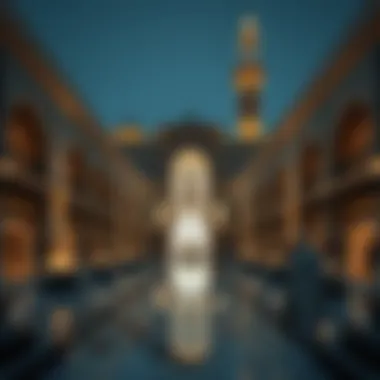Ramadan 2024 in the UAE: Cultural and Economic Insights


Intro
Ramadan is not simply a month of fasting; it's a pivotal moment that shapes the very fabric of life in the United Arab Emirates. As 2024 approaches, Muslims across the UAE prepare for a period steeped in spirituality, community, and reflection. But the significance of Ramadan transcends mere religious observance—it influences various spheres of life, including cultural practices, social interactions, and even economic activities.
In this article, we aim to shed light on the myriad ways Ramadan impacts life in the UAE, especially concerning real estate and investment opportunities. From the bustling markets to the supportive communal spirit, we'll explore how the holy month fosters unity among residents, while also giving insights into the distinctive dynamics within the real estate market. Both investors and homeowners will benefit from understanding the shifting landscape—armed with smart buying tips and financing options to navigate this unique period.
The calendar brings Ramadan in 2024 a blend of joy and reverence, marked vividly by communal Iftar dinners, cultural events, and charitable endeavors. Each year, the patterns of daily life transform, showcasing the adaptability of the economy to such deep-rooted traditions. This approach presents a wealth of opportunities, particularly for those looking to explore property investments and align themselves with the vibrancy that Ramadan brings to the UAE.
Join us as we uncover the evolving tapestry of Ramadan in 2024, reflecting on its significance while offering practical insights to navigate the season within the UAE’s bustling real estate market.
Prelims to Ramadan
Ramadan holds a significant place in the hearts of Muslims worldwide, and especially in the UAE. Each year, this sacred month presents both spiritual reflection and community engagement. The practices observed during this period have a profound impact not only on personal faith but also on societal interactions and economic trends.
Delving into Ramadan is essential for understanding how it affects modern life in the UAE. It’s not merely about fasting; it's a tapestry woven with rich historical threads, spiritual depth, and communal bonds.
Beyond personal growth, Ramadan fosters a sense of unity among families and friends, binding communities together through shared experiences. Homeowners, investors, and expatriates can also glean insights into shifting behavioral patterns, which may influence market demands. Thus, a closer exploration of Ramadan leads to deeper comprehension of the UAE's cultural ethos and economic landscape.
Historical Context
Ramadan's history stretches back to the very roots of Islam. The month commemorates the moment when the Quran was revealed to Prophet Muhammad. Throughout history, Ramadan has represented a time of introspection, prayer, and increased devotion among believers.
In the UAE, the observance of Ramadan reflects local traditions intertwined with the teachings of Islam. Historical records depict how various dynasties and tribal leaders shaped the practice of Ramadan, often incorporating elements unique to the region. This context elucidates how deep-seated beliefs and cultural practices contribute to the societal fabric of the UAE today.
The Spiritual Significance
At its core, Ramadan is fundamentally about spiritual growth and self-discipline. Fasting during daylight hours is not merely an act of abstaining from food and drink, but a method of purifying the soul. The act of refraining from indulgences acts as a reminder of the less fortunate and fosters empathy and compassion.
In Dubai, mosques come alive during this month, full of worshippers seeking spiritual solace and connection. The nightly Taraweeh prayers become moments of communal belonging, drawing people together in shared faith. This sense of spiritual significance transcends beyond religious obligations, providing a framework for personal growth and relational bonding.
Ramadan Customs and Traditions
Ramadan customs vary from one community to another, but common threads unite them. One distinctive practice is the Iftar, the meal enjoyed after sunset to break the fast. In the UAE, this meal fuses traditional Arab dishes like Harees and Mashboos with international cuisine, reflecting the multicultural nature of the nation.
Loyalty to customs also manifests in charitable actions, with many prioritizing donations during Ramadan. Various organizations work tirelessly to distribute food and resources to those in need, highlighting a collective spirit of giving.
Moreover, newly introduced practices, such as Ramadan markets and community events, emerge every year, bridging the gap between tradition and modernity. These events not only nurture cultural engagement but also offer economic opportunities for local businesses, making Ramadan a period of both reflection and action across a wider spectrum of society.
Ramadan Dates in the UAE
Understanding the dates of Ramadan 2024 in the UAE is crucial, not only for the faithful but also for communities, businesses, and investors. Being a month of fasting, prayer, and reflection, Ramadan affects daily life extensively—impacting work schedules, social activities, and economic conditions. Knowing when Ramadan begins and ends helps individuals and businesses plan accordingly, thus facilitating better engagement with the local culture and traditions that flourish during this holy month.
Expected Start and End Dates
In 2024, Ramadan is expected to commence in the evening of March 10, contingent upon the sighting of the moon, and conclude with Eid al-Fitr on April 9. These dates, however, can vary slightly depending on lunar sightings, which is vital for the Muslim community.
During Ramadan, the routine shifts dramatically; for instance, many businesses adjust their hours. In bustling urban areas like Dubai and Abu Dhabi, offices might reduce their operational hours to allow employees to participate in religious observances. As a result, understanding the specific dates helps families and individuals navigate these changes effectively, ensuring they can manage both personal and professional responsibilities while honoring their faith.
The Importance of Moon Sighting
Moon sighting is a deeply ingrained practice within Islamic tradition, serving as both a spiritual and logistical guide for determining the month of Ramadan. In the UAE, local religious authorities typically announce the sighting of the new moon, which marks the beginning of fasting. This age-old practice is not merely ceremonial; it's a reflection of the community's connection to nature and its rhythms.
The importance of moon sighting extends beyond mere timing; it symbolizes unity and collective observance among the Muslims in the UAE.
In practical terms, moon sighting impacts various sectors. For example:


- Hospitality and Retail: Local restaurants adapt their services, while retailers adjust their inventory, typically stockpiling goods that are in demand during Ramadan.
- Real Estate: Many landlords and property managers prepare for shifts in tenant needs, often providing special rates for families moving in.
- Investors: Knowing when Ramadan starts allows investors to strategize regarding spending behaviors and market trends that emerge during this period.
Social Impact of Ramadan in the UAE
Ramadan is more than just a month of fasting; it serves as a linchpin in the social fabric of the UAE. The significance of this holy month presents a unique opportunity for community bonding and charitable initiatives, weaving together both traditional values and modern lifestyles. The social impact of Ramadan resonates throughout various demographics, enhancing both local and expatriate interactions. As this article unfolds, we will delve into how Ramadan cements relationships and provides avenues to contribute to a greater good, setting the stage for a more cohesive society.
Community Bonding
During Ramadan, the atmosphere in the UAE shifts considerably. People from all walks of life come together, eschewing their daily routines to break bread at Iftar, the meal that marks the end of the fast each day. These gatherings, whether in homes or community centers, foster an unparalleled sense of togetherness.
- Cultural Exchange: For expatriates, this month becomes an opportunity to immerse themselves in the rich tapestry of local traditions. Many participate in Iftar events, gaining insight into the customs that shape Emirati culture. This acts as a bridge, connecting diverse communities in a meaningful way.
- Family Fixtures: Families take it upon themselves to gather more often during Ramadan. The shared timing of meals allows for reconnections, as conversations blossom over dates and traditional dishes. This reaffirms the importance of family ties in a fast-paced world.
- Neighborhood Activism: Local events and activities such as communal prayers create a shared purpose and strengthen neighborhood relations. Walking to the mosque, for instance, facilitates chance encounters and friendly chats, further knitting the community together.
"It’s like the holy month blurs the lines of individualism, fostering a collective spirit that resonates through every Emirati street, from Dubai’s bustling markets to the serene corners of Sharjah."
Charitable Activities
One of the most distinguished aspects of Ramadan is the emphasis placed on charity and social responsibility. The holy month inspires both a spirit of giving and tangible support for those in need. Charitable initiatives abound, illustrating not just goodwill, but also the deep-rooted compassion inherent in the culture.
- Zakat and Sadaqah: Many residents fulfill their religious obligations of Zakat, a mandatory form of charity, during this time. Organizations like the UAE Red Crescent Society facilitate these donations ensuring aid reaches many households. Additionally, Sadaqah, or voluntary charity, often sees a spike, with people contributing food or money to those less fortunate.
- Food Drives and Sponsorships: Restaurants and local businesses often launch food drives to support underprivileged families. Initiatives like 'Sponsor an Iftar meal’ have become quite popular, allowing people to purchase meals that are then distributed to those in need. This creates a greater communal focus on service, kindness, and philanthropy.
- Engagement with Youth: Ramadan is also a time for engaging the younger generation in charitable work. Collected funds, organized events, and community service activities empower youth to understand the value of altruism. Many young adults participate in volunteering efforts, learning first-hand the importance of giving back.
The urgency to support one another forms a unique social climate that thrives during Ramadan, ensuring that both the spirit of the community and guests' well-being are prioritized.
In sum, the social implications of Ramadan in the UAE extend beyond mere observance; they cradle a culture of togetherness, compassion, and support. Engaging in community activities and charitable acts during this time fosters long-lasting relationships that strengthen the fabric of society.
Economic Aspects of Ramadan
The holy month of Ramadan doesn't just bring spiritual reflection and community togetherness; it also significantly shapes the economic landscape in the UAE. As many residents engage in fasting and joyous celebrations, a unique ripple effect takes place across various sectors. Understanding these economic aspects helps investors and homeowners navigate this seasonal shift effectively.
Consumer Behavior Changes
During Ramadan, shopping behavior undergoes a remarkable transformation. Families become more budget-conscious, yet they often seek special deals as they prepare for Iftar - the meal breaking the fast.
- Increased Spending Patterns: While one might expect a decline in retail activities due to fasting, the opposite is often true. Many families intensify their spending on groceries, food products, and festive items, keen to prepare sumptuous meals for Iftar and Suhoor (the pre-dawn meal).
- Preference for Local Markets: Buyers tend to favor local markets and community grocery shops. This supports not only local vendors but also fosters a sense of community spirit, as people come together to shop for celebratory meals. Local supermarkets often witness a spike in sales of items like dates, juices, and traditional sweets, aligning with customs.
- Rise of Digital Shopping: With more consumers opting to shop online, Ramadan has seen a surge in e-commerce. Shoppers benefit from the convenience of browsing and purchasing goods without the hassle of navigating crowded stores.
Engaging in these new shopping trends, the businesses that quickly adapt to consumer preferences during this time often reap significant rewards. They might offer tailored promotions and discounts to target the festive audience, maximizing potential sales.
Ramadan Sales and Promotions
Retailers know that Ramadan is not only an opportunity for cultural engagement but also a chance to boost sales. Strategies employed during this period are both strategic and innovative.
- Tailored Promotions: Many companies introduce exclusive discounts designed for Ramadan. This includes buy-one-get-one-free deals, bulk purchase discounts, and bundled offers featuring typical Ramadan foods, which are particularly enticing for consumers preparing for elaborate meals.
- Night Markets and Events: Various retail hubs organize night bazaars during Ramadan. These markets not only showcase local crafts and cuisines but also provide a vibrant shopping experience, drawing consumers who prefer to shop after sunset. Participating in these events offers merchants a unique chance to engage with a diverse audience.
- Collaboration with Brands: Numerous retailers partner with popular brands to offer limited-edition products. For instance, a well-known beverage might launch a special Ramadan packaging or flavor, which attracts customers looking for something unique during the month.
"Ramadan is not merely a month of fasting; it's a season of giving and sharing, reflected in the economy."
In essence, the economic aspects around Ramadan create a dynamic interplay between cultural significance and market behavior. Investors who understand these shifts can position themselves favorably, whether it's through real estate opportunities or capitalizing on emerging local trends.
For more insights on the economic implications of Ramadan, refer to relevant resources like Wikipedia and Britannica.
The potential for profit and growth seems ever-strong during Ramadan, underscoring its importance as not just a religious occasion, but a cornerstone in the economic calendar of the UAE.
Real Estate Trends During Ramadan
Ramadan is not merely a month of fasting; it serves as a reflective period that impacts various sectors, with real estate being no exception in the UAE. Understanding the trends during Ramadan provides insight into how the market adapts and responds to changes in consumer behavior, community dynamics, and economic factors. Investors, homeowners, expatriates, and agents must pay closer attention to these shifts, as they can lead to significant opportunities.
Shifts in Rental Demand


As Ramadan approaches, a notable shift occurs in rental demand, which seems to surge in certain areas. Families often seek to move closer to their places of worship or vibrant community hubs that foster togetherness during the holy month. Areas like Al Quoz and Jumeirah, which boast a rich tapestry of cultural events, become prime spots.
- Seasonal Demand: There is typically an uptick in demand leading up to Ramadan, seen particularly in residential properties close to mosques or cultural centers.
- Short-Term Rentals: If you’re in the business of property rentals, be alert for opportunities in short-term leases. Many expatriates opt to move for the month, seeking furnished apartments or villas that cater to larger families gathering for Iftar.
- Family-Oriented Spaces: Properties with gardens and communal areas see their appeal rise as families want to break their fast in a welcoming atmosphere. As large gatherings become commonplace, space becomes a vital factor in rental choices.
During Ramadan, rental market trends reflect a blend of community and convenience, shaping decisions for numerous families and investors alike.
Investment Opportunities
Real estate investors should keep an eye out for unique opportunities that arise during Ramadan. The month is not just about community; it’s also a time for business and development potential. Here are some areas to consider:
- Commercial Properties: With the increase in demand for Iftar and Suhoor events, restaurants and cafes often look for prime commercial spaces. Properties in bustling districts can yield attractive returns.
- Residential Development: Understanding that families relocate during Ramadan opens doors for the development or renovation of residential properties aimed at providing desirable living spaces. Consider investing in suited floor plans for larger families.
- Cultural Projects: Investing in projects aligning with the cultural essence of Ramadan can be a long-term play. Spaces that host cultural events or gatherings during Ramadan can attract a steady stream of visitors year-round.
Ramadan can be a catalyst for real estate market movements, emphasizing the need for both caution and opportunity awareness.
Investing in real estate during this month demands an understanding of these shifts and the ability to adapt strategies to meet changing demands. Staying informed and responsive is key to capitalizing on the unique landscape that Ramadan brings to the UAE real estate market.
As the demand evolves, investors and homeowners alike must consider the potential returns on properties that align with community gatherings and cultural importance during this sacred period.
Neighborhood Activities and Events
When Ramadan rolls around, the entire atmosphere in the UAE shifts. Neighborhoods come alive with a joyous spirit, woven tighter through communal activities and events. During this holy month, the social landscape is marked by an increase in engagement among residents, irrespective of their cultural backgrounds. It’s not just about fasting; it’s about coming together, sharing moments, and forging bonds that often last beyond the month itself.
Iftar Gatherings in the Community
As the sun sets, the sound of the adhan echoes, marking the end of a day of fasting. Neighborhoods in the UAE embrace the tradition of Iftar with open arms. Iftar gatherings are more than simple meals; they embody the spirit of Ramadan itself. Families, friends, and even newcomers to the community unite around tables laden with delicious dishes, breaking bread after a long day.
The importance of these gatherings cannot be overstated. Here are a few key benefits:
- Social Cohesion: Iftar fosters relationships among diverse groups. People from various backgrounds participate, sharing not only food but also stories and cultural insights.
- Culinary Exchange: Every family brings a dish to the table, often reflecting their heritage. This allows for a delightful fusion of flavors. One might be surprised by the sight of Emirati harees next to a spicy Indian biryani.
- Charitable Outreach: Many neighborhoods host community Iftar events that often encourage donations for the less fortunate. It’s a beautiful way of giving back while indulging in the festive atmosphere.
Iftar gatherings serve as an open invitation, not just to share a meal but to share a moment—a moment that embodies understanding and compassion.
Cultural Events and Festivals
In addition to Iftar, neighborhoods buzz with cultural events and festivals throughout Ramadan. The UAE holds a rich tapestry of traditions that come to life during this month. These events are critical for enhancing cultural understanding and appreciation among residents. Consider the following:
- Art Exhibitions: Local artists display work that often reflects themes of spirituality and community, inviting residents to view art through a Ramadan lens.
- Traditional Music Nights: These events feature performances that get everyone tapping their feet. Visiting artists perform in public spaces, creating a festive ambiance well into the night.
- Cooking Classes: Some neighborhoods host classes where residents can learn to make classic Ramadan dishes. It's a hands-on approach, allowing participants to savor the flavors—and the stories—behind beloved recipes.
The wide array of neighborhood activities not only heightens the festive atmosphere, but they also strengthen community ties. Both Iftar gatherings and cultural events present an opportunity for residents to express their values and beliefs, fostering greater harmony and unity in the heart of the UAE.
Lifestyle Adjustments for Residents
During Ramadan, the lifestyle of residents in the UAE undergoes significant changes. These adaptations stem from the cultural and religious practices that define this holy month. It's not just about fasting; it’s about creating a cohesive atmosphere within the community, balancing professional commitments, and fostering a spirit of respect and empathy.
In this section, we will explore crucial components of lifestyle adjustments residents make during Ramadan, including adjustments in work hours and dining practices, which can greatly enhance their experience of this sacred time.
Work Hours Adjustments
One of the most noticeable changes during Ramadan is the alteration of work schedules. Many companies adjust their operating hours to accommodate these changes. The United Arab Emirates government usually dictates the reduced working hours, allowing employees to complete their tasks while respecting the significance of fasting and prayer.
Most businesses often reduce work hours to around six per day. Public sector employees, on the other hand, may have even shorter hours. This adjustment is designed to help employees maintain their energy levels and focus during the day when they cannot eat or drink.
Employees need to communicate these changes effectively among colleagues and clients to ensure smooth workflows. Some may worry about productivity, but many find that these shortened hours can lead to increased efficiency as workers prioritize critical tasks. Keeping open lines of communication with management about what works best for productivity during this month can also make a great difference.
Dining Restrictions During Daylight


Dining practices during Ramadan present another significant lifestyle shift for residents. Fasting from dawn until sunset means refraining from eating or drinking during daylight hours. For many, this can be challenging, especially in a bustling city like those in the UAE, where social gatherings often revolve around food.
However, this restriction also brings about a unique camaraderie. More restaurants and cafes will prepare special menus for iftar—the evening meal at sunset that breaks the fast. Local traditions often encourage communal gatherings around iftar tables, bringing together families and friends alike.
Interestingly, some eateries intentionally limit their daytime operations, while others provide designated areas for non-fasting patrons—allowing for some hospitality without compromising the spirit of the month. Those not participating in fasting usually conduct themselves discreetly, respecting the traditions that are central to this period. Having a personal understanding of these dynamics ensures that everyone can adapt respectfully while still enjoying the richness of community life.
As the month unfolds, residents will find that these lifestyle adjustments contribute to a greater sense of community, reflection, and growth—a rich experience during Ramadan.
Challenges Faced During Ramadan
Navigating the holy month of Ramadan in the UAE can present several challenges, particularly for those balancing the demands of work and social obligations alongside the requirements of fasting. It's essential to understand these challenges to foster a supportive environment, ensuring productive yet respectful practices during this sacred time.
Balancing Work and Fasting
For many working professionals in the UAE, the convergence of work schedules and fasting can feel like walking a tightrope. The early start to the day often means hitting the ground running, even before dawn breaks. Employees may find themselves grappling with fatigue as the day wears on, making it imperative for employers to show flexibility. Adaptations in work hours become a common practice, as many companies may shift to shorter days.
This adjustment can bring about both positive and negative effects. On one hand, employees might appreciate the additional time for rest, while on the other, the compressed work hours can lead to overwhelming workloads where deadlines loom large. Additionally, maintaining productivity while fasting calls for strategic planning—prioritizing energy-intensive tasks earlier in the day can lead to better outcomes.
Maintaining Public Etiquette
The social context of Ramadan extends beyond individual experience; it influences the collective atmosphere. Public etiquette during this period assumes heightened importance as respect for fasting individuals and traditions shapes public interactions. Non-Muslims residing in the UAE need to be especially mindful of this, as the cultural fabric woven during Ramadan is one of unity and respect.
Eating or drinking in public during daylight hours can be seen as highly inappropriate, and many expats appreciate guidelines for how to conduct themselves properly. Notably, some establishments may even enforce policies that promote this respect, leading to a gradual increase in cultural awareness among non-Muslim residents.
It’s also important to recognize that while many people might be fasting, they still engage in normal business practices and maintain their roles within the workforce. A considerate approach can ensure that all members of the community feel respected, fostering inclusiveness.
"Ramadan is not just a month of fasting; it's a time for understanding and respect among different cultures."
In summary, while challenges such as balancing work responsibilities with fasting and maintaining appropriate public conduct can emerge during Ramadan, awareness and mutual respect can help create a harmonious environment. Both employees and employers can navigate this period effectively, paving the way for a celebratory and inclusive Ramadan experience in the UAE.
Future Outlook: Ramadan Beyond
As the world shifts and evolves, so does the observance of Ramadan in the UAE. Looking towards the future, it's essential to consider how the spiritual and cultural practices surrounding this holy month will adapt and change in the years to come. This section engages with key trends, emerging challenges, and potential opportunities that lie ahead, offering insights into the future of Ramadan. Understanding these elements is vital for investors, homeowners, expatriates, agents, and developers who are seeking to align their strategies with the unique and changing dynamics of the region.
Predicted Trends and Changes
Ramadan in the UAE has always been more than just a time for fasting; it’s a period that fosters community and cultural expression. Based on current observations, several trends are expected to shape Ramadan after 2024:
- Technological Integration: The use of apps and platforms for daily prayers, meal schedules, and community events will likely increase. People might turn to innovative solutions that ease the process of fasting and inform community gatherings.
- Sustainable Practices: The UAE is actively pursuing sustainability initiatives. Expect to see more eco-friendly practices during Ramadan, such as reduced plastic waste during Iftar meals and emphasis on locally-sourced food. This powerful shift not only aligns with a global trend but also reflects a growing community awareness.
- Cultural Exchange: As tourism continues to thrive, Ramadan could welcome more international guests, further enriching the local experience. This may encourage the fusion of cultural practices, enhancing the diversity of community gatherings.
"In every end, there is a new beginning." The future of Ramadan signifies opportunities for refinement and transformation.
Long-Term Economic Implications
The economic landscape during Ramadan has traditionally seen an uptick in various sectors, such as retail, hospitality, and even real estate. With foresight into future implications, we can expect the following:
- Retail Growth: As shopping habits evolve, retailers might pivot their strategies to cater to a more digital-savvy customer base, focusing on special promotions that coincide with Ramadan. E-commerce platforms could dominate, changing the face of shopping for Iftar essentials.
- Hospitality Demand: As international tourism flourishes during the holy month, hotels may see a surge in bookings. Special Ramadan packages could become the norm, driving revenue for the hospitality sector.
- Real Estate Opportunities: With an increase in expatriates during Ramadan, the demand for rental properties and temporary accommodations might spike. This trend could present significant investment opportunities for property developers.
- Increased Charitable Contributions: The spirit of giving is at the heart of Ramadan. As communities become more interconnected, the potential for charitable donations to grow could have a positive impact on social welfare programs. Investors may find it beneficial to align with these initiatives, fostering goodwill and community relations.
Overall, the future looks promising for Ramadan observance in the UAE. The key will be adaptability, recognizing changing consumer behaviours, and maintaining the rich traditions that make this month special.
Finale
As we draw our exploration of Ramadan in the UAE for 2024 to a close, it's important to assess the various dimensions we’ve covered. This month is not just a time of fasting; it encapsulates cultural richness, offers economic implications, and fosters community connection. Understanding the effects of this holy month can lead to enhanced social harmony and greater insight for investors and residents alike.
Summation of Key Points
Throughout the article, we have highlighted several key elements related to Ramadan in the UAE:
- Historical Significance: Ramadan’s roots in Islamic tradition serve to enhance its observance today, fostering a deeper respect for its customs.
- Economic Influence: The month brings fluctuations in consumer behaviour, with sales spikes in food, furniture, and apparel, reshaping the retail landscape.
- Community Engagement: From iftar gatherings to charitable acts, Ramadan strengthens ties in neighbourhoods, promoting a sense of belonging.
- Lifestyle Adjustments: Unique considerations for working hours and dining restrictions impact both local and expatriate residents comprehensively.
- Future Outlook: There’s potential for evolving traditions and economic dynamics in years to come, indicating that Ramadan's significance may adapt with a changing society.
Final Thoughts on Ramadan in the UAE
Ramadan serves as a beacon highlighting the UAE's cultural ethos and collective spirit. For expatriates, understanding its impact can help in fostering positive relations with local communities. As an investor or homeowner, recognizing the seasonal shifts can inform better decisions, whether it be in real estate or business ventures.



